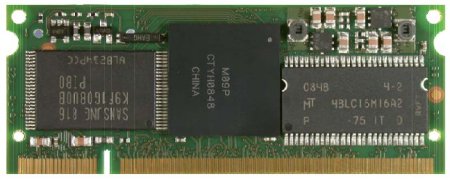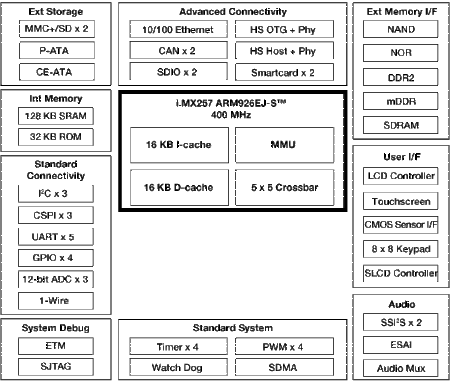$80 module runs Linux
Jul 13, 2009 — by LinuxDevices Staff — from the LinuxDevices Archive — 6 views The Swedish company Strategic Test has announced a SODIMM-sized processor module using Freescale's recently announced i.MX25 SoC (system-on-chip). The Linux-compatible “Tx-Star” features a 400MHz i.MX257, 64MB of RAM, 128MB of flash, and an LCD controller, and is available with an evaluation baseboard.
The Swedish company Strategic Test has announced a SODIMM-sized processor module using Freescale's recently announced i.MX25 SoC (system-on-chip). The Linux-compatible “Tx-Star” features a 400MHz i.MX257, 64MB of RAM, 128MB of flash, and an LCD controller, and is available with an evaluation baseboard.
Strategic Test says the Tx-Star will sell for approximately $80 in the U.S., and touts it as the industry's "lowest-priced system on module that is capable of running standard OSes such as Linux and Windows CE." The company also cites a "world's first," though we believe that the Tx-Star is basically identical to the Denx TX25 that was announced last week.

Strategic Test's Tx-Star
(Click to enlarge)
By whatever name, the module includes a Freescale i.MX25 processor clocked at 400MHz, 64MB of RAM, and 128MB of flash memory. The i.MX257 SoC used in the Tx-Star is one of two high-end industrial versions of the i.MX25 design. The SoC provides basic connectivity options along with an LCD controller, resistive touchscreen controller, camera sensor interface, two smartcard interfaces, two CAN interfaces, and an ESAI interface for audio applications (see diagram below). An i.MX258 version is identical except that it adds an on-chip security engine and "highly specific" tamper detection circuitry.

Freescale i.MX257 block diagram
(Click to enlarge)
Strategic Test notes that unlike the other Ka-Ro-derived SODIMM modules, the Tx-Star uses standard DDR memory rather than mobile SDRAM. As a consequence, its power consumption is a little higher, at approximately 0.5 Watts, the company says.
Features and specifications listed by Strategic Test for the TX-Star module (and by Ka-Ro for the TX25) include:
- Processor — 400MHz Freescale i.MX25
- Memory — 64MB mobile DDR-SDRAM (expandable to 128MB), and 128MB of flash storage
- Display — Supports up to 800 x 600 via 24-bit LCD interface
- Networking — 10/100 Ethernet
- Storage — PATA interface
- Other I/O and expansion interfaces:
- 5 four-wire UARTS
- Camera interface
- USB 2.0 host
- USB 2.0 device
- I2C
- 2 x SSI/AC '97/I2S
- 2 x CAN
- 2 x SDIO
- Power supply — 3.3V power supply with sources including 1-cell Li-Ion/Polymer battery (3.0V to 4.2V); 5.0V USB supply; AC wall adapter
- Dimensions — 2.6 x 1.0 x 0.16 inches (67.6 x 26 x 4.2mm)
- Operating temperature — -40 to 185 deg. F (-40 to +85 deg. C)
The Development Kit-5 baseboard
According to Strategic Test, the Tx-Star is compatible with the previously available Development Kit-5 baseboard (manufactured by Ka-Ro, and marketed by Direct Insight and Denx too). Featuring a SODIMM socket for the TX37 module, the baseboard also has two additional slots for SD cards.

The Development Kit-5 provides real-world connectors and headers
(Click to enlarge)
Features added by the Development Kit-5 development board are said to include:
- 2 x SD card slots
- USB 2.0 host and device connectors
- VGA port with D-SUB connector
- 10/100 Ethernet port
- 3.5mm headphone jack
- 2 x RS232 ports (one with 9-pin connector, one with 10-pin header)
- Camera interface
- JTAG interface
- Dimensions — 6.3 x 3.9 inches (160 x 100mm)
Bob Giblett, President of Strategic Test, stated, "We are very excited about the TX-Star as this is the lowest priced 32-bit system-on-module that is capable of running standard OSes such as Linux and Windows CE. For companies currently using 16-bit MCU's who are strangled by performance and lack of code transportability, we believe the Tx-Star offers a terrific alternative in this economic climate."
Availability
Strategic Test did not announce a release date for the Tx-Star, but the device appears to be available now, along with the existing Development Kit-5 baseboard. Pricing starts at approximately $80 in single quantities, the company says. More information may be found on the Strategic Test website, here or Ka-Ro Electronics website, here.
This article was originally published on LinuxDevices.com and has been donated to the open source community by QuinStreet Inc. Please visit LinuxToday.com for up-to-date news and articles about Linux and open source.